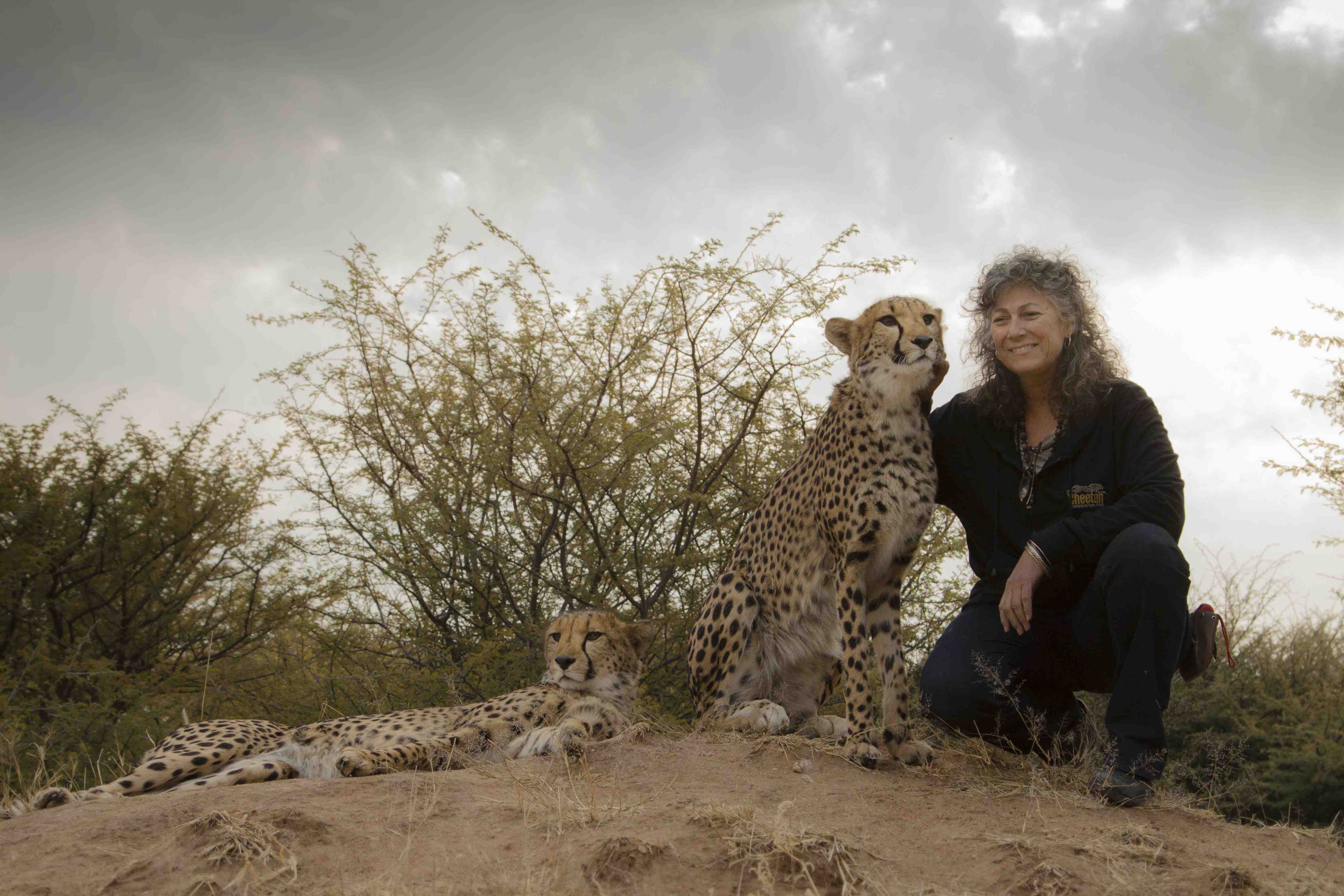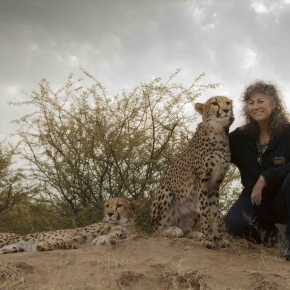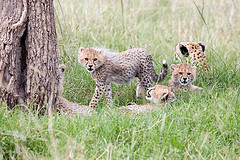
Did you know the most endangered big cat in Africa is not lion, or leopard?
The most endangered African big cat is the cheetah. Learn how Laurie Marker’s Cheetah Conservation Fund is changing that fact.
Dr. Markers understanding of cheetah habitat has led to solutions that will be a model for dealing with human-wildlife conflict issues worldwide.
Laurie Marker talks to Lori Robinson at SavingWild.

1. Why are Cheetah the most endangered cat in Africa?
The two biggest threats to the cheetah are human wildlife conflict, and habitat loss. Cheetahs, unlike some other big cats, don’t do well in protected areas. Consequently, about 90 percent of wild cheetahs live alongside human populations where the cheetah is viewed as a threat.
In addition, many of the remaining wild cheetahs throughout Africa exist in small populations, making them more vulnerable to disease due to lack of genetic diversity. It’s crucial to create large landscapes, or corridors, where cheetah and other wildlife can move freely.
2. Where did your desire to help cheetah originate?
I first encountered cheetahs when I took a job as a veterinary technician at Wildlife Safari in Oregon (USA). I was fascinated by the cats. At that time (1974) there hadn’t been a lot of research done, and the cheetah was at risk of extinction. Soon I became the expert on cheetahs, and in 1990 I founded Cheetah Conservation Fund (CCF), and moved to Namibia.
What Laurie Marker learned about cheetah
3. What does it take to be Dr. Laurie Marker – to be an effective conservationist?
Effective conservation starts with passion, and the research to accomplish results. When I first arrived in Namibia I spent my time asking questions and researching the answers.
 Conservation is most effective when initiatives embrace the whole ecosystem, including the human populations. At CCF we’re working with livestock farmers, providing them with ways to protect their herds from cheetahs and other predators, and we have education programs aimed at farmers, school students, conservation biologists and the general public.
Conservation is most effective when initiatives embrace the whole ecosystem, including the human populations. At CCF we’re working with livestock farmers, providing them with ways to protect their herds from cheetahs and other predators, and we have education programs aimed at farmers, school students, conservation biologists and the general public.
So it’s this: looking at practical solutions and never giving up. Conservation takes a long time.
BUY LAURIE MARKER’S BOOK: A FUTURE FOR CHEETAHS
4. What is the best thing about living in the african bush, and having such close contact with cheetahs?
Being able to work with cheetahs every day is amazing, however, I think the best part about what I do is seeing the work we do impact the communities here in such a positive way, and seeing how attitudes about the cheetah are changing. Now Namibians are proud to be the Cheetah Capital of the World, and I’m really happy to have precipitated that change with our work through the Cheetah Conservation Fund.
“We have to learn to coexist with predators sustainably”
5. Since Cheetah live in closer proximity to humans than other large cats, how to save the Cheetah, and cheetah habitats can act as a model for the larger issue of human wildlife conflict. Humans aren’t going away anytime soon, and if we don’t learn to live with wildlife, we will end up without them and that would be a horrible place to be. If we learn what it takes to live with cheetah, we will learn about human wildlife conflict in general. This isn’t really a question but do you have anything to add here or any other things you want to say?
Addressing human wildlife conflict has been central to our work for years at the Cheetah Conservation Fund, because it’s one of the biggest threats to the cheetah. It’s about more than just “learning to live with” predators but rather to coexist with them sustainably. It’s about ensuring that the communities that live alongside predators are thriving. You can’t ask a farmer to care about conserving wildlife and cheetah habitat when he’s struggling just to feed his family.
Our work has taught us that a community can successfully live alongside large predators, and those predators can actually be a source of economic growth for the community. That’s good news for everyone.
Do you want to add a visit to Laurie Marker’s cheetah sanctuary to your African safari itinerary. I can help. I offer a one hour phone consult to answer all your safari questions and help you create a life-changing journey.
Did you know: You can Visit, or Volunteer at the Cheetah Conservation Fund.
Contact them: Cheetah Conservation Fund.
10 Replies to “Laurie Marker – Cheetah Conservation Fund”
Comments are closed.

What a beautiful animal. Is there a big difference between the cheetah, leopard, and cougar?
Yes, so beautiful. All the cats you mention are gorgeous. They are all solitary animals only coming together to mate, need big ranges for their territory, and the leopard and cougar are very elusive and nocturnal while the cheetah are seen more frequently on an African safari and hunt in daylight. Cougars have no spots and the patterns on the other two cats are different from each other. But as I mentioned in the article, the big surprise to me is that the cheetah is the most endangered cat in Africa. Only 10,000 estimated to be left.
hi,
this is a very good project! I’ve always admired your work with nature and animals. A fine thing that I support any time
I love them too!
The Cheetah also is the closest bred and thus most vulnerable [due to this] of all the worlds big cats. With little genetic variety within and this has been the knife edge situation for many years. We are now doing this to the Tiger as humans erase them from the earth! Causing inbreeding in small remaining pockets of cats that desperately try to hang on.
Nice article Lori. Laurie marker is a wonderful lady… The world needs more people like this…
Thanks for your comments and info Cam. Yes, unfortunately the lack of genetic diversity is becoming more of a common issue for many species. I love highlighting people like Laurie and Shivani (two weeks ago) and just spent 2 evening with Cynthia Moss (ellies) and will be posting about her in the near future.
I have always loved Cheetahs.I do worry for their future.Thank you for helping save the Cheetah.
Thanks for sharing these articles Lori… It is great to see the dedicated work of people in the field who are doing all they can to save today’s wildlife for tomorrow. I hope that the day soon arises that all our concerns over viable breeding populations, genetic sustainability, poaching, slaughter, cruelty and extinction are long gone… A big ask, however the animal kingdom deserves so much better from the human race and we owe it to them… I look forward to the coming articles. 🙂
I agree, the animals deserve so much better. I hope one day they have legal rights just like we do so that people can really fight on their behalf. If we all keep doing our part, we will get there. There have been some wonderful strides in the US recently with Chimps in Labs, something we have been working on changing forever. I will keep writing about good news and animal heroes like Laurie and Shivani so that we can continue to be inspired and passionate in our efforts for all animals.
Can you come to Indy?